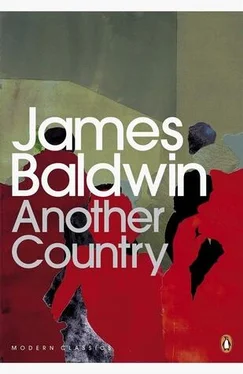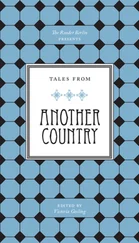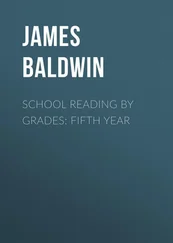“When was she here?”
“Yesterday. And she called me tonight. And she’s been to the police. Everybody’s been worried, Cass, Richard, everybody—”
He sat up. “The police are looking for me?”
“Well, hell, yes, baby, people aren’t supposed to just disappear.” He walked into his small, cluttered kitchen and opened his refrigerator, which contained a quart of milk and half a grapefruit. He stared at them helplessly. “I’ll have to take you out, I haven’t got anything to eat in this joint.” He closed the refrigerator door. “You can have a drink, though, I’ve got some bourbon.”
Vivaldo made two drinks, gave one to Rufus and sat down on the other, straight-backed, chair.
“Well, let’s have it. What’ve you been doing, where’ve you been?”
“I’ve just been wandering the streets.”
“My God, Rufus, in this weather? Where’ve you been sleeping?”
“Oh. Subways, hallways. Movies sometimes.”
“And how’d you eat?”
He took a swallow of his drink. Perhaps it was a mistake to have come. “Oh,” he said, astonished to hear the truth come out, “sometimes I sort of peddled my ass.”
Vivaldo looked at him. “I guess you had pretty rough competition.” He lit a cigarette and threw the pack and the matches to Rufus. “You should have got in touch with somebody, you should have let somebody know what was happening.”
“I — couldn’t. I just couldn’t.”
“We’re supposed to be friends, you and me.”
He stood up, holding an unlit cigarette, and walked around the small room, touching things. “I don’t know. I don’t know what I was thinking.” He lit the cigarette. “I know what I did to Leona. I’m not dumb.”
“So do I know what you did to Leona. Neither am I dumb.”
“I guess I just didn’t think—”
“What?”
“That anyone would care.”
In the silence that hung in the room then, Vivaldo rose and went to his phonograph. “You didn’t think Ida would care? You didn’t think I would care?”
He felt as though he were smothering. “I don’t know. I don’t know what I thought.”
Vivaldo said nothing. His face was pale and angry and he concentrated on looking through his records. Finally he put one on the machine; it was James Pete Johnson and Bessie Smith batting out Backwater Blues .
“Well,” said Vivaldo, helplessly, and sat down again.
Besides Vivaldo’s phonograph, there wasn’t much else in his apartment. There was a homemade lamp, brick-supported bookshelves, records, a sagging bed, the sprung easy chair, and the straight-backed chair. There was a high stool before Vivaldo’s worktable on which Vivaldo teetered now, his coarse, curly black hair hanging forward, his eyes somber, and his mouth turned down. The table held his pencils, papers, his typewriter, and the telephone. In a small alcove was the kitchen in which the overhead light was burning. The sink was full of dirty dishes, topped by a jaggedly empty and open tin can. A paper sack of garbage leaned against one of the kitchen table’s uncertain legs.
There’s thousands of people, Bessie now sang, ain’t got no place to go, and for the first time Rufus began to hear, in the severely understated monotony of this blues, something which spoke to his troubled mind. The piano bore the singer witness, stoic and ironic. Now that Rufus himself had no place to go— ’cause my house fell down and I can’t live there no mo’, sang Bessie — he heard the line and the tone of the singer, and he wondered how others had moved beyond the emptiness and horror which faced him now.
Vivaldo was watching him. Now he cleared his throat and said, “Maybe it would be a good idea for you to make a change of scene, Rufus. Everything around here will just keep reminding you — sometimes it’s better just to wipe the slate clean and take off. Maybe you should go to the Coast.”
“There’s nothing happening on the Coast.”
“A lot of musicians have gone out there.”
“They’re on their ass out there, too. It’s no different from New York.”
“No, they’re working. You might feel differently out there, with all the sunshine and oranges and all.” He smiled. “Make a new man of you, baby.”
“I guess you think,” said Rufus, malevolently, “that it’s time I started trying to be a new man.”
There was a silence. Then Vivaldo said, “It’s not so much what I think. It’s what you think.”
Rufus watched the tall, lean, clumsy white boy who was his best friend, and felt himself nearly strangling with the desire to hurt him.
“Rufus,” said Vivaldo, suddenly, “believe me, I know, I know — a lot of things hurt you that I can’t really understand.” He played with the keys of his typewriter. “A lot of things hurt me that I can’t really understand.”
Rufus sat on the edge of the sprung easy chair, watching Vivaldo gravely.
“Do you blame me for what happened to Leona?”
“Rufus, what good would it do if I did blame you? You blame yourself enough already, that’s what’s wrong with you, what’s the good of my blaming you?”
He could see, though, that Vivaldo had also hoped to be able to avoid this question.
“Do you blame me or don’t you? Tell the truth.”
“Rufus, if I wasn’t your friend, I think I’d blame you, sure. You acted like a bastard. But I understand that, I think I do, I’m trying to. But, anyway, since you are my friend, and, after all, let’s face it, you mean much more to me than Leona ever did, well, I don’t think I should put you down just because you acted like a bastard. We’re all bastards. That’s why we need our friends.”
“I wish I could tell you what it was like,” Rufus said, after a long silence. “I wish I could undo it.”
“Well, you can’t. So please start trying to forget it.”
Rufus thought, But it’s not possible to forget anybody you were that hung up on, who was that hung up on you. You can’t forget anything that hurt so badly, went so deep, and changed the world forever. It’s not possible to forget anybody you’ve destroyed.
He took a great swallow of his bourbon, holding it in his mouth, then allowing it to trickle down his throat. He would never be able to forget Leona’s pale, startled eyes, her sweet smile, her plaintive drawl, her thin, insatiable body.
He choked slightly, put down his drink, and ground out his cigarette in the spilling ashtray.
“I bet you won’t believe this,” he said, “but I loved Leona. I did.”
“Oh,” said Vivaldo, “believe you! Of course I believe you. That’s what all the bleeding was about.”
He got up and turned the record over. Then there was silence, except for the voice of Bessie Smith.
When my bed get empty, make me feel awful mean and blue,
“Oh, sing it, Bessie,” Vivaldo muttered.
My springs is getting rusty, sleeping single like I do.
Rufus picked up his drink and finished it.
“Did you ever have the feeling,” he asked, “that a woman was eating you up? I mean — no matter what she was like or what else she was doing — that that’s what she was really doing?”
“Yes,” said Vivaldo.
Rufus stood. He walked up and down.
“She can’t help it. And you can’t help it. And there you are.” He paused. “Of course, with Leona and me — there was lots of other things, too—”
Then there was a long silence. They listened to Bessie.
“Have you ever wished you were queer?” Rufus asked, suddenly.
Vivaldo smiled, looking into his glass. “I used to think maybe I was. Hell, I think I even wished I was.” He laughed. “But I’m not. So I’m stuck.”
Читать дальше












